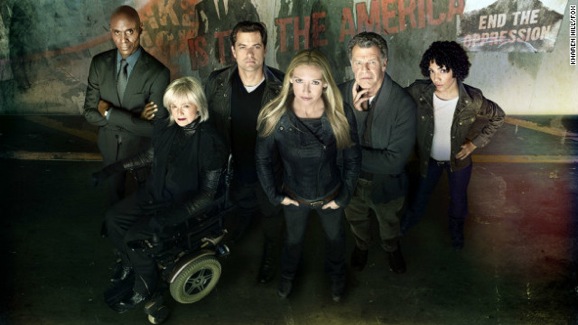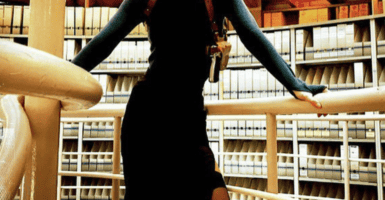Fringe Post Game: Liberty/An Enemy Of Fate
This article is more than 2 years old
Goodbye, Fringe, it’s been fun.
Back-to-back episodes marked the conclusion of the fifth and final season of Fox’s embattled sci-fi police procedural. Despite near rabid fanaticism from fans, not to mention widespread critical love, the show never posted big ratings, and has seemingly been fighting for survival forever. Last season, when the network moved the show to a Friday-night time slot—widely regarded as a desolate wasteland where TV shows go to die—it became painfully apparent that Fringe was not long for this world. Many of us were surprised, if not shocked, when Fox re-upped for a fifth, albeit truncated, season. Watch the end of season four and you get the distinct impression that the producers weren’t certain they would get the chance to wrap things up.

But now Fringe is gone for good, though it won’t soon be forgotten. March of 2013 will see the release of Fringe: September’s Notebook, a companion piece to the show, and last fall the Science Channel began airing the series in syndication. It will be around if you’re keen to find it. Given the intense devotion fans already feel, you can imagine an ever-increasing groundswell of support for Fringe, perhaps one day even a Firefly-like cult status.
For a show that’s thrown as many curveballs as Fringe has over the years, the series went out without a ton of twists, turns, or shocking reveals. If you watched the episode last week, “The Boy Must Live,” they tell you how things are going to play out, and, aside from a few complications with their plan to reset time, that’s the path the finale follows. While that may sound like a cop-out, or at least a less than satisfying end to some, it was a close-to-perfect conclusion.
Instead of spending valuable time and energy on outlandish plot points and trying to blow your mind, the final chapters of Fringe focused more on the characters and their relationships. As inventive as the show is, this is what truly sets it apart, what has been its biggest strength, and it’s great to see that acknowledged. The final two episodes are heavy on the emotion, and I’m not going to lie, there were a handful of moments where I teared up.
Don’t worry, though, the end isn’t all weepy farewells. There is plenty of action, and though you get an excess of information dumped on you from time to time—they cram a lot into two episodes—tension drives the story along at a nice pace. Fans will also appreciate little touches mixed in throughout, nods to the show’s history and previous fringe cases.
Even though the final two episodes are stitched together to form what is more or less a single artifact, they’re still distinct entities, and for the sake of continuity, we’ll talk about them as such.
“Liberty”
“Liberty” belongs to Olivia (Anna Torv); it really is her episode. That’s how it was when Fringe began, Olivia front and center. Over the years the show moved away from that and became more of an ensemble as Peter (Joshua Jackson) and Walter (John Noble) increasingly moved into the foreground. They were always a vital component—Walter has been the heart and soul of Fringe since day one—but it was Liv’s vehicle initially. This season, especially, she’s played a smaller role, so fans should appreciate taking one last turn around the dance floor with her. It’s one of many nice homages to where Fringe began.
At the end of “The Boy Must Live,” Michael, the pint-sized anomaly, turned himself over the Observers in order to distract them from the rest of the Fringe team. “Liberty” dives right into that sticky situation as the crew hunts for the boy, who is a key element of their plan. While they hunt for Michael, Broyles (Lance Reddick) is able to discover the prisoner’s location, though in doing so he places himself in harm’s way as the pasty, bald bastards suspect him of being a mole.
Michael is held on Liberty Island, now an impenetrable fortress, as well as another tip of the cap to earlier Fringe storylines. There’s only one way to execute this daring rescue. It may sound crazy, but it might be just crazy enough to work. See, the only way into the facility is through the other side, the other universe. Here’s the problem: all the Cortexiphan has burned out of Olivia’s system, and in order to get the levels she needs to cross over, a series of painful injections directly into the base of her brain is required. Then there are the potential side effects, like hallucinations, coming unglued in time, and general disorientation. But Liv is a trooper, and it will take more than the threat of death or complete mental collapse to stop her from saving the day.
While Walter, Peter, Olivia, and Astrid (Jasika Nicole) prep their rescue mission, Captain Windmark (Michael Kopsa) attempts to interrogate Michael. I say “attempts” because he’s not all that successful. Unable to penetrate the boy’s psyche, his voice and thoughts echo back at him until his nose bleeds and he pops a blood vessel in his eye. You’re not sure, but there may be a slight look of satisfaction on Michael’s face.
Before Olivia jumps universes, she shares a moment with Peter, raising the question, what’s the point of saving the world if he loses Olivia in the process? Taken to a logical extension, the question becomes, what if you lose everything that matters to you?
Once on the other side, we meet up with some old friends, namely Faux-Livia, who has apparently joined the cast of The Matrix if her outfit is any indication, and agent Lincoln Lee (Seth Gabel). They’re happily married with a couple little rug rats—though that doesn’t stop Lincoln from checking out young Olivia’s ass. Not only does this help in the rescue attempt, but it also ties up one of many dangling story threads, giving some closure to that chapter.
With a surprisingly minimal amount of help from her former partner and alterna-self, Olivia and Michael make an action-packed escape. Because nothing can be that easy, there’s a moment when it looks like she’s in the middle of an acid trip, hallucinations of Etta swimming in her mind, with a foot in both worlds.
At the same time the rescue mission unfolds, September/Donald is up to his own solo mischief, assembling the machine they intend to use to send Michael into the future, which looks like the world’s fanciest bong. Again, nothing is ever simple, and he has to procure one final piece of the puzzle. His search sends him another familiar face, December, one of the original 12 Observers. Not the safest choice in the world, it is his only option to get the tech they need to pull of their scheme.
When we reach the end of “Liberty” the mission is in a precarious position, Broyles is completely screwed, and everything is up in the air. Fortunately for us, we don’t have to wait an entire week to find out what happens next.
“An Enemy of Fate”
The final episode of Fringe is all about self-sacrifice. There is sacrifice for the greater good, for friends, and for family.
Donald and December have an in-depth conversation about emotion, parenthood, and destiny. The bulldog-faced December believes feelings have tainted his former colleague, and that erasing the Observers from existence flies in the face of their fate. In that calm, cool way he has, Donald simply reminds him that destiny can be changed if one only has the sheer force of will to do so.
While Walter, Anil, and the rest of the resistance put the finishing touches on their plan, Broyles grabs some necessities from his office. Little does he know that his car has been bugged, and that the Observers intend to use him to locate the rebels.
When everyone reconvenes back at Harvard, they take a moment to spell out the specifics of the plan. Just in case you missed it, they’re going to send Michael to the year 2167, where scientists will see that it is possible to exponentially increase intellect without sacrificing the emotional centers of the brain. Thus the Observers will never come to be.
One detail is left out, however: the fact that Walter plans to sacrifice himself and accompany Michael to the future. Digging through the amber in the lab, Peter stumbles across a tape that Walter made explaining what he must do, and why he must go. In the last episode Peter was confronted with the possibility of losing Olivia, and had to consider if the potential cost is worth it. Now, confronted with the looming loss of his father, he has to decide if the prospect of seeing Etta again outweighs the sacrifice. As you can imagine, this is not a simple choice, and when Walter tells his son that he is his “very favorite thing,” things may have gotten a little misty on my end.
“An Enemy of Fate” features many moments like this. Where it would be very easy to add these scenes, showrunner J.H. Wyman, who wrote and directed this episode, weaves them into the script. They’re seamless pieces of the puzzle that occur as natural extensions of the plot.
What follows is a fast-paced sprint to the finale of the series. So many complications arise. Broyles is captured, December is found out, the machine is missing a piece, and everything is in disarray. This, however, is not some low-rent bunch of quitters who give up the first time they face adversity. No, this is the damn Fringe team we’re talking about here. They’re winners, they persevere, and damn it, they’re going to find a way to overcome.
If you’ve watched “An Enemy of Fate” then you know what comes next—hope is given, hope is taken away, intense battle sequences ensue. Basically, it’s everything you expect from a fight to save the world. Peter and Olivia dig into Walter’s collection of past Fringe cases to save Broyles from the Observer HQ—they employ chest-bursting nematode worms, hallucinatory butterflies, and the stuff that makes your eyes, nose, and mouth seal shut—in a gore-soaked sequence that has definite echoes of Alien.
Because this is Fringe, they even manage to take a few moments to have some fun. Like when Astrid finds Gene, Walter’s cow, encased in Amber. Or when Walter gives Peter a clip of anti-gravity bullets. When Peter questions why you need a body to float away after it’s already dead, Walter’s gleeful response is, “Because it’s cool.” This definitely feels like one last chance for the writers to squeeze in an idea they couldn’t fit in anywhere else, but at the same time it’s also a classic bit of Walter.
For all the talk of changing destiny, of protecting your children, and the attempts to alter the future, the plan unfurls largely as expected. Even though Donald inoculates himself and intends to take Walter’s place, to finally be a father to Michael, that’s not how things play out. In the climactic firefight he catches a stray bullet, and, as designed, duty compels Walter to step into the future.
In the end we witness a scene that we’ve seen play out many times throughout the fifth season of Fringe. We began with Peter, Olivia, and a young Henrietta at a park, basking in the sun. As the moment developed before, an invading force of Observers arrived and wrecked up the joint. This time, however, the scenario has a different trajectory. What we watch now is a peaceful, idyllic affair enjoyed by a loving family. The entire season—perhaps the entire series—has led up to this correction.
When the Bishop clan arrives home, Peter opens a letter from his father. The envelope contains Walter’s long-lost white tulip. In that instant, that split second before the credits roll for on Fringe for the final time, the look on his face says he remembers. It wouldn’t be the first time characters have retained memories of other timelines, and it wouldn’t feel like Fringe if they didn’t leave you guessing.
Though some of the action in “An Enemy of Fate” leaves something to be desired, it is a worthy finale. You dig into the mythology the show has built up over five seasons, and the characters, and the relationships between them, are as strong and vital as ever.
What did you think of the grand finale? Did it deliver the closure you hoped for, or are there too many loose ends flapping in the breeze? Hit up the comments section and we can discuss this further.












